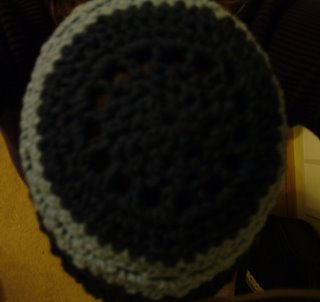My first thought, about halfway through the movie, was that I was a little disappointed. I already knew all that stuff. So... I decided to give the whole thing a shot before making up my mind. After the movie and the half hour update I came to the conclusion that, yes, I already knew all that stuff. At that point, though, instead of being disappointed, I was relatively encouraged -- hey, I already KNEW all that stuff! Thanks to the worlds of PBS, the BBC, and NPR, we've seen and heard our share of news on global trends over the past few years. We've heard about the glaciers melting (we even saw evidence of that when we went to Glacier Nat'l Park a couple years ago), the coral reefs dying, the lakes shrinking, and the relationship between the carbon levels and temperature in ice cores. Yes, we find that sort of nerdy television interesting, so we've immersed ourselves with it whenever possible.
So, nothing Mr. Gore had to say was new to us. But the most exciting part of the whole movie for me was the credits. No, not because it was over. To the contrary, I think it was pretty well done and informative and you ought to see it if you haven't. But the credits were interesting to me because mixed in with the names of all the people were ways you could do your part to help slow global warming. And as Leif and I watched the suggestions go by, it was like a checklist of things we already do.
- Use energy efficient lighting. check.
- Turn down your thermostat. check. (Brrrr... notice I'm crocheting a HAT? There's a reason.)
- Use mass transit when possible. err... Bozeman's still working on a mass transit system. But Leif does carpool to work and I carpool to craft night when I can.
- Recycle. check. We compost, too. (That wasn't on the list.)
- If you can, buy a hybrid car. check.
- Ride your bike or walk to work. check. Leif rides his bike in the summer.
- Use renewable energy sources. This one is prohibitively expensive right now. If we had $15,000 for solar panels, we'd do it in a heartbeat.
- Vote for politicians who will pursue legislation to change environmental policies. check.
- Tell people about An Inconvenient Truth. check.
Here's my thinking on "saving the planet." The earth is the Lord's and everything in it. He has called us to be good stewards of the things He has given us. That includes the earth. As a Christian, I feel that it is my duty to be responsible with the gifts God has given. That means my talents and abilities, my husband and daughter, my body, my property, my neighbors, my enemies, and my planet. Should we save our planet at the cost of our lives? (ie- do we spend so much of our time, energy, and resources on developing new ways to reduce greenhouse gasses that we forsake the relationships we have and demonstrate a lack of love for our neighbors?) No. Do we go into serious debt to put solar panels on our roof? Not right now. And I'm okay with that. There is a balance. But I do believe that where possible, we should do everything we can within reason to take care of God's world. How will our children learn to be good stewards if we don't model stewardship for them? It's a good legacy.
A discussion for another day is how all of this stewardship/conservation thinking affects my favorite things... like scrapbooking. I've got a few thoughts on that subject as well, but it's almost midnight, so they'll have to wait.
If you haven't seen An Inconvenient Truth, do. It's worth the watch, especially if you've never given a second thought to the issue of global warming. And if anyone has any comments on what I've said here, I'd love to hear them. It's good for discussion, and this is a subject that ought to be discussed.
In closing, I leave you with a peek at my "Inconvenient Truth" hat. No pattern, just keeping my hands busy so my brain would be free to process the information at hand. The second photo is of the detail on the top. Reduce, Reuse, Recycle. We've all heard it. Here's one way I put it into action. What have you done?


4 comments:
I agree about knowing a lot of the information, but I was very interested that the info became so accessible and compiled through Al Gore. I hadn't seen images like the ones presented in the the movie. Yes, everything wasn't so new, but I am glad it is out there to be approached by a large group of people.
Nice Hat!
Yes, we know most of it too. But, what we were excited about is that it was packaged in a way that people who DON'T know and have very short attention spans can understand quickly. I feel that it was persuasive in a positive way.
Also, I think when they say "use renewable energy" they might be talking about states like Texas where we have a choice who will be our electricity provider, and we can choose Green Mountain Energy, which produces electricity through wind power rather than coal power.
yes, I agree that it was very well presented. And Al Gore actually had quite a bit of charisma during his presentations. I hadn't seen all of the graphs before, and certainly not compiled together. I guess I was just expecting a little more in depth information. But it is presented in a really accessible way, with good data and positive, doable suggestions for change.
I wish we could have the option to choose our power company, J. That sounds wonderful! MT has done a lot with wind energy recently, but it hasn't really made its way to us yet. Solar is really the only feasible option we have right now, and like I said, it's expensive. One benefit to the solar (and wind, I suppose, if we had a way to do that - probably not in our subdivision backyard) is that the power company will buy any energy you generate and don't use. We have friends with solar panels who do that a lot. Pretty cool if you ask me.
Ted and I watched the movie last night. A coworker asked Ted to watch it because they are going to show it at LeTU for one of their forum things. I thought it was very well done also. I appreicated seeing the images to see how fast it really is moving. I think it's easy for Christians to just blow it off with, "oh Jesus is coming soon that won't affect us." There really are so many people in the world that don't think environmentally or feel responsible in any way for the environment. Ted says it pretty much how you do with being a Christian and our responsibility to take care of what God has given us. We usually buy everything used (furniture, clothes, cars). It's partly our way of recycling. Ted's dream is to eventually use a biodiesel to run a generator for heating/cooling etc for our house. He's the all time geek at school with all his environmental things. It's been incredible though because he's making a difference. A lot of people have started using biodiesel because of him. Now he's building an electric motorcycle and students are interested in helping him with that too.
Didn't mean to write my own post. :) I've been thinking alot of the same things so it's been on my mind. Thanks for posting it.
Post a Comment